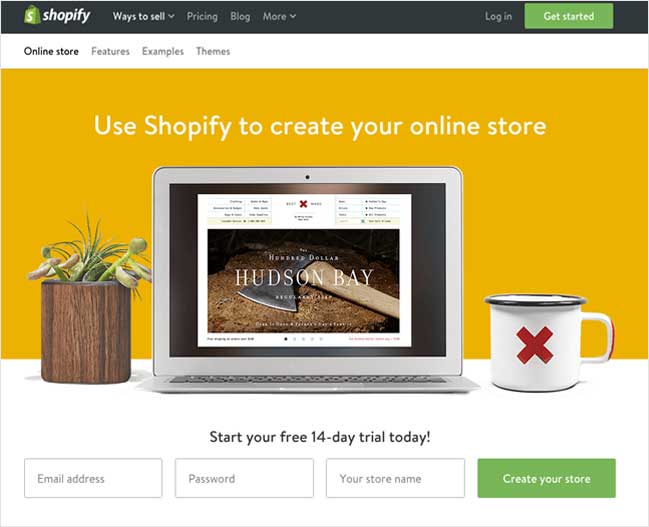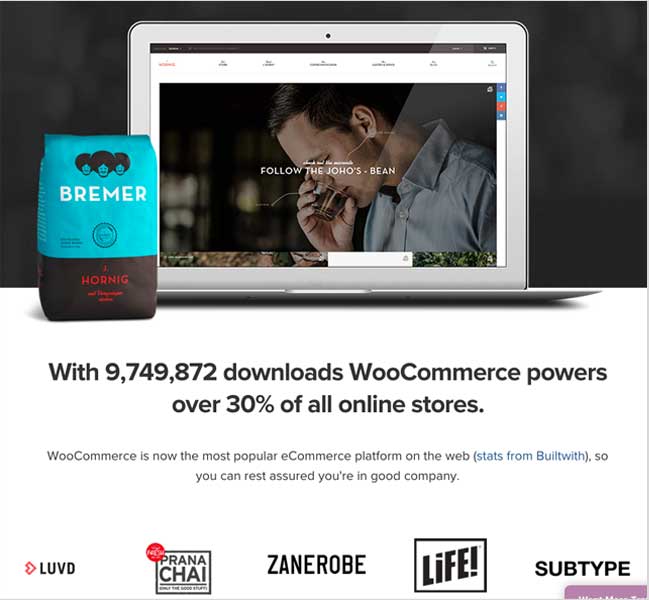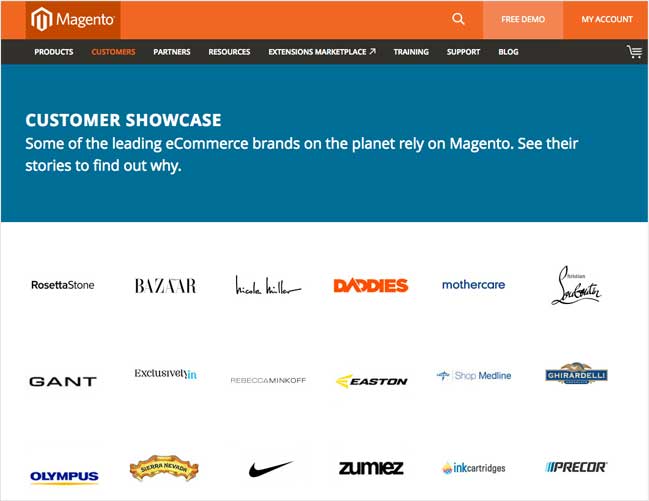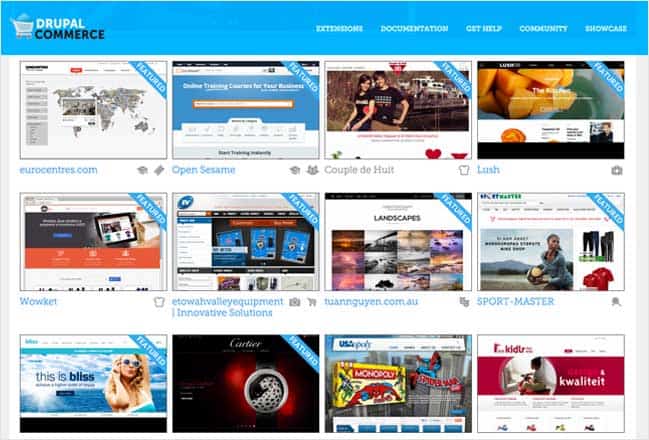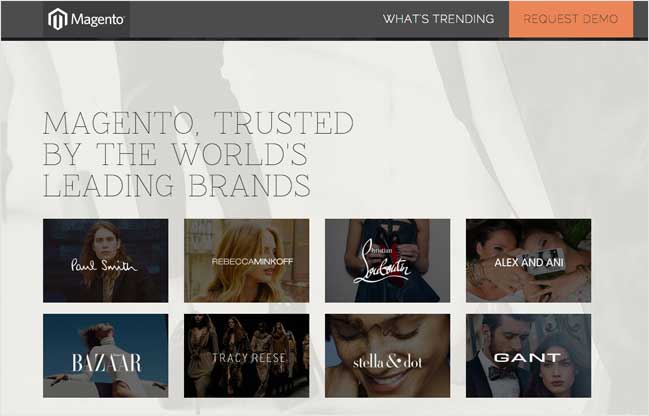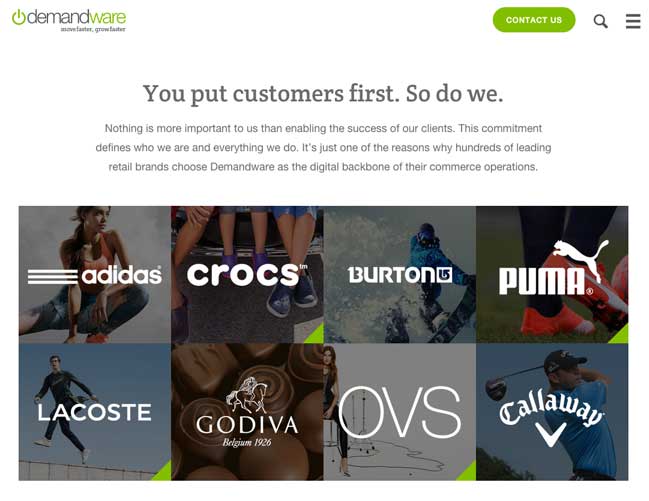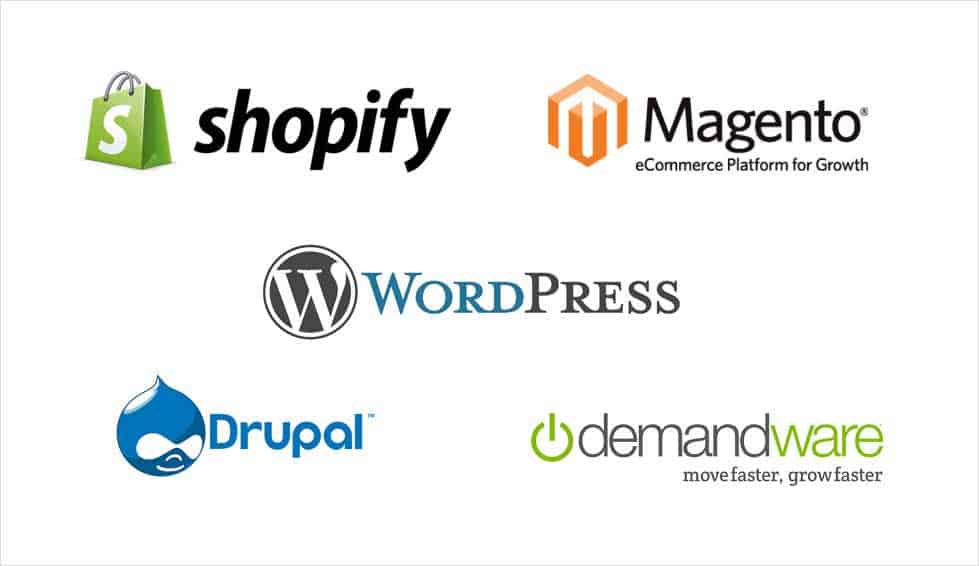
Choosing the right Ecommerce CMS platform to power your online store can be a daunting task. Your CMS should facilitate streamlining and automating your internal processes, while allowing for future flexibility and growth. Today we’ll review our top choices for businesses ranging from mom and pop shops to national retailers.
When it comes to ecommerce content management systems, even industry experts get into heated debates about which is the top choice. As a company with extensive ecommerce expertise, we have used just about every CMS available, and have formulated our own opinions based on observations, client feedback and industry insights.
Below is a list of common business types (bucketed by size), along with our recommended ecommerce CMS platform for each.
Startup
Suggested CMS: Shopify, WordPress
For new retailers looking to sell a small number of products, without the need for complex features or functionality, Shopify and WordPress are great options. Both are extremely user friendly, cost effective and have everything a small business owner needs to launch an online store.
Shopify is a subscription based plug-and-play solution that allows you to launch a website in a matter of hours. Sign up for an account, choose a pre-built template, upload your products and you’re up and running.
Shopify also takes the headache out of setting up an ecommerce site by taking care of hosting, payment gateway and SSL certificate for you. This is a huge time and money saver, and well worth the value to those who would rather focus on their business, and leave technical matters to someone else.
Pros:
– Includes Payment Gateway and SSL certificate
– No knowledge of development required
– Many beautiful mobile-friendly themes in the marketplace
– Plans are very cost effective
– Shopify handles hosting, which is lightning fast and reliable
– SEO friendly, with ability to edit basic on-site elements
WordPress is a free, open source platform that powers over 74-million websites and has been around since 2001. While not originally built for ecommerce, recent advances in WordPress’ “WooCommerce” platform have made it a great option for small businesses who don’t want to be locked into a subscription-based model like Shopify.
The most attractive aspect of using WordPress is its flexibility. There are ready-made themes for virtually every type of business, and they come loaded with pre-defined page types, slick UI elements and the ability to build custom pages on the fly.
Pros:
– The most popular CMS on the planet, due to a user-friendly interface and quick learning curve.
– Available themes and plugins for virtually any business type and website function.
– Easy to find developers to help with creating custom themes or modifying pre-built themes.
– Tons of online documentation and tutorials for DIY management.
– SEO friendly, with ability to edit basic on-site elements
Small-Medium Business
Suggested CMS: Magento Community Edition, Drupal
Small to medium online stores may be selling anywhere from a few hundred to tens of thousands of products, and often require ecommerce features not available in CMS platforms designed for startups.
Magento and Drupal have risen to the top of the ecommerce CMS market, due to their appeal to established businesses who need a platform that is able to scale with them as their business grows.
Both platforms allow retailers to do things like:
– Integrate a vast number of CRM and ERP platforms with their online store
– Gain full control over Sales and Promos
– Implement multi-language and multi-currency functionality
– Operate with no restrictions on number of products, database storage, web traffic, etc.
– Customize to fit business needs
Magento Community is a free and open-source platform, with enough out-of-the-box functionality to suit the majority of small to medium size businesses. It’s built on the popular PHP coding language, making it developer-friendly and quite easy to customize.
For small businesses looking to save time and money, there are pre-built Magento themes that can be configured easily, or customized as needed. Alternatively, you can hire a developer to create a custom site using Magento’s free code base. Either way, you get access to all default features, and access to a marketplace with thousands of plugins for adding custom functionality.
Unlike Shopify and WordPress, Magento Community is a heavy and complex system that requires the help of a seasoned web developer with a full understanding of how to optimize it for performance. Since the Community version is not maintained or overseen by Magento, you and your developer will be solely responsible for keeping the site in working order.
Pros:
– Free and open-source
– Lots of free and premium themes available
– Default Authorize.net and PayPal integration
– Robust platform with robust set of default features
– Highly customizable
– Large number of marketplace extensions available
– Highly active community for assistance, tutorials and troubleshooting
– More SEO-friendly when compared to other CMS platforms
– Highly scalabe for future growth
– Default multi-store feature for managing several stores within a single admin panel.
– Default multi-language feature
– SEO friendly, with ability to edit basic on-site elements
Drupal is another free and open-source content management system that offers robust ecommerce solutions. Drupal is best known for content/community based features; however, its ecommerce capabilities have made it a preferred option for some of the world’s best known brands. Zappos is built on Drupal. Enough said.
Similar to Magento Community Edition, Drupal is a free, open-source, php-based system that offers both pre-built themes or free reign of its code base for custom development. While Drupal’s “Drupal Commerce” platform is fairly new and not as popular as Magento, we are huge fans and feel it will explode in popularity over the next few years.
Pros:
– Free and open-source
– Lots of free and premium themes available
– Default Authorize.net and PayPal integration
– Robust platform with robust set of default features
– Highly customizable
– Large number of marketplace extensions available
– Highly active community for assistance, tutorials and troubleshooting
– Great modules for community and social features
– Highly scalabe for future growth
– Default multi-store feature for managing several stores within a single admin panel.
– Default multi-language feature
– SEO friendly, with ability to edit basic on-site elements
Large – Enterprise Business
Best CMS: Magento Enterprise Edition, Demandware, Custom CMS
For well established retailers with hundreds of thousands of SKUs and a large number of daily traffic and orders, it’s critical for an ecommerce platform to be finely tuned for performance, speed and scalability.
Enterprise ecommerce platforms offered by Magento and Demandware are our two favorite options for large brands looking for a packaged solution instead of building a custom site from scratch. However, many of the biggest retail brands have highly customized sites built on niche coding languages like Ruby on Rails, Java and Python.
Magento Enterprise Edition is a premium solution for Enterprise level brands. Unlike Community Edition, Enterprise has a minimum price tag of $15,000 per year, which includes robust performance, sales, marketing and customization options.
Unlike Community Edition, Enterprise was built and is maintained by Magento developers. It’s been optimized for superior performance and includes some great tools for automating and streamlining a brand’s internal processes.
Additionally, Magento recently launched a “Fashion Edition” for Enterprise, which is already being used by brands like Harper’s Bazaar, Rebecca Minkoff, Tracy Reese, Christian Louboutin and Paul Smith.
Benefits:
– Full-page caching for improved page load speed
– One-page checkout
– Responsive design
– Personalized shopping with targeted promotions
– Advanced pricing rules
– Automated email reminders
– Private shopping|
– Gift wrapping and messaging
– High performance architecture to support thousands of sales per hour
– PA-DSS compliance and encryption
– Staging environment
– Mobile SKDs for iOS and Android
Demandware has been around since 2004, and has built an impressive cloud-based, multi-tenant platform that gives big brands highly scalable, secure and reliable ecommerce capabilities.
It’s core offering is that it combines all necessary IT infrastructure into one system, which streamlines operations for brands with multiple storefronts or the need to rapidly roll out new sites on-demand. For example, they launched 22 sites in under 2 years for Columbia.
The brands using Demandware to power their online sales is a testament to the quality of their product. Companies listed on their website include Adidas, Brooks, Burton, Clarins, Cole Haan, Columbia, Converse, Kate Spade, Loreal and many more.
Benefits:
– Multi-brand, multi-store management under one roof
– Omni-Channel management (In-Store POS + Ecommerce)
– Focus on IT infrastructure and performance
– Website and POS management via one application
– Predictive intelligence for personalized shopping
– Custom Content Management Systems are used by brands big enough to have full in-house teams and/or the money to retain a digital agency to build and maintain an ecommerce website.
Often, custom enterprise-level online stores are built on languages like Ruby on Rails, Python, Java and ASP. Developers with expertise in these languages are harder to find and more expensive, which can substantially increase costs.
A custom CMS requires proprietary development of tools associated with managing inventory, products, customers and sales. Additionally, it requires a well orchestrated technical setup that connects hosting server, website, ERP, CRM and other important 3rd parties, and ensures they all work in unison.
Here’s a small list of major retail brands using custom CMS platforms, along with the languages their sites are coded in:
– JCrew: Java Platform, Enterprise Edition (J2EE)
– Macy’s: Java Platform, Enterprise Edition (J2EE)
– Nordstrom: ASP.NET
– Urban Outfitters: ASP.NET / ATG Commerce (Oracle)
– ASOS: ASP.NET
– Airbnb: Ruby on Rails
– Groupon: Ruby on Rails
– Etsy: Python
Let`s Get
In Touch
Contact us today for a free consultation
and cost estimate for
your project.
We work with companies in all
industries, big or small.
Give Us a Call: 786-529-6039
Services
©2024 FUZE DIGITAL INC. Ignite Your Brand™ | privacy



